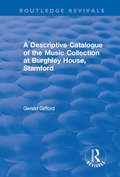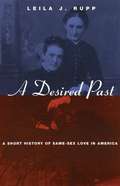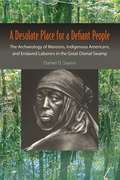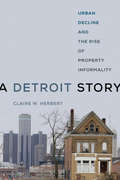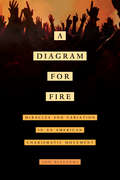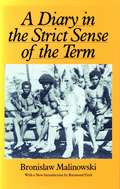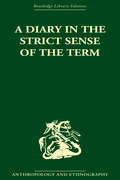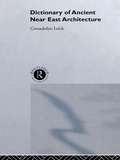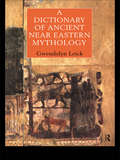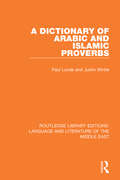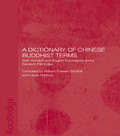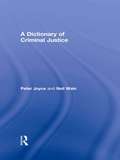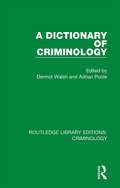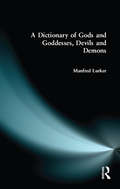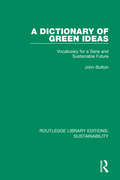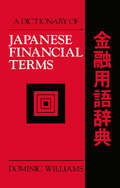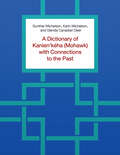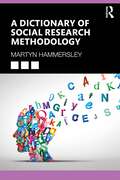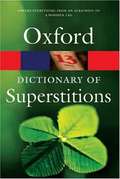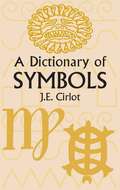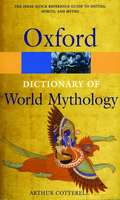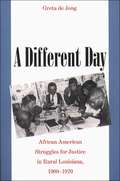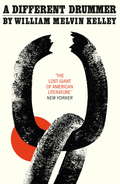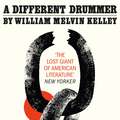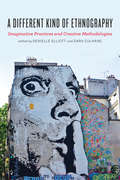- Table View
- List View
A Descriptive Catalogue of the Music Collection at Burghley House, Stamford (Routledge Revivals)
by Gerald GiffordThis title was first published in 2002: Burghley House, Stamford, was built between 1555 and 1587 for William Cecil, Lord Burghley, the Lord High Treasurer to Queen Elizabeth I. The library there contains an extensive collection of manuscript and printed music dating from about 1650 to 1850, substantially formed during the latter part of the 18th century by the Ninth Earl of Exeter. The collection is given particular significance by the inclusion of several rare and in some cases apparently unique volumes. This catalogue examines the Burghley House music collection in the light of contemporary documentary evidence. The opening section describes the people who added to the collection and their musical enthusiasms. This approach brings the collection to life and also enables us to appreciate emergent trends in British music history of the period. With each entry fully described and the printed music referenced to RISM or CPM, this catalogue should form a valuable reference source for all scholars of British music from the 17th to the 19th century.
A Desired Past: A Short History of Same-Sex Love in America
by Leila J. RuppeWith this book, Leila J. Rupp accomplishes what few scholars have even attempted: she combines a vast array of scholarship on supposedly discrete episodes in American history into an entertaining and entirely readable story of same-sex desire across the country and the centuries. "Most extraordinary about Leila J. Rupp's indeed short, two-hundred-page history of 'same-sex love and sexuality' is not that it manages to account for such a variety of individuals, races, and classes or take in such a broad chronological and thematic range, but rather that it does all this with such verve, lucidity, and analytical rigor. . . . [A]n elegant, inspiring survey." —John Howard, Journal of American History
A Desolate Place for a Defiant People: The Archaeology of Maroons, Indigenous Americans, and Enslaved Laborers in the Great Dismal Swamp
by Daniel Sayers<p>In the 250 years before the Civil War, the Great Dismal Swamp of Virginia and North Carolina was a brutal landscape—2,000 square miles of undeveloped and unforgiving wetlands, peat bogs, impenetrable foliage, and dangerous creatures. It was also a protective refuge for marginalized individuals, including Native Americans, African-American maroons, free African Americans, and outcast Europeans. <p>In the first thorough archaeological examination of this unique region, Daniel Sayers exposes and unravels the complex social and economic systems developed by these defiant communities that thrived on the periphery. He develops an analytical framework based on the complex interplay between alienation, diasporic exile, uneven geographical development, and modes of production to argue that colonialism and slavery inevitably created sustained critiques of American capitalism.</p>
A Detroit Story: Urban Decline and the Rise of Property Informality
by Claire W. HerbertBringing to the fore a wealth of original research, A Detroit Story examines how the informal reclamation of abandoned property has been shaping Detroit for decades. Claire Herbert lived in the city for almost five years to get a ground-view sense of how this process molds urban areas. She participated in community meetings and tax foreclosure protests, interviewed various groups, followed scrappers through abandoned buildings, and visited squatted houses and gardens. Herbert found that new residents with more privilege often have their back-to-the-earth practices formalized by local policies, whereas longtime, more disempowered residents, usually representing communities of color, have their practices labeled as illegal and illegitimate. She teases out how these divergent treatments reproduce long-standing inequalities in race, class, and property ownership.
A Diagram for Fire: Miracles and Variation in an American Charismatic Movement
by Jon BialeckiWhat is the work that miracles do in American Charismatic Evangelicalism? How can miracles be unanticipated and yet worked for? And finally, what do miracles tell us about other kinds of Christianity and even the category of religion? A Diagram for Fire engages with these questions in a detailed sociocultural ethnographic study of the Vineyard, an American Evangelical movement that originated in Southern California. The Vineyard is known worldwide for its intense musical forms of worship and for advocating the belief that all Christians can perform biblical-style miracles. Examining the miracle as both a strength and a challenge to institutional cohesion and human planning, this book situates the miracle as a fundamentally social means of producing change—surprise and the unexpected used to reimagine and reconfigure the will. Jon Bialecki shows how this configuration of the miraculous shapes typical Pentecostal and Charismatic religious practices as well as music, reading, economic choices, and conservative and progressive political imaginaries.
A Diary in the Strict Sense of the Term
by Bronislaw MalinowskiAlmost certainly never intended to be published, Malinowski's diary was intensely personal and brutally honest. He kept it, he said, "as a means of self-analysis." Reviews ranged from "it is to the discredit of all concerned that the diary has now been committed to print" to "fascinating reading."Twenty years have passed, and Raymond Firth suggests that the book has moved over to a more central place in the literature of anthropological reflection.
A Diary in the Strictest Sense of the Term
by Bronislaw MalinowskiThe volume presents the diary of one of the great anthropologists at a crucial time in his career. Malinowski's major works grew out of his findings on field trips to New Guinea and North Melanesia from 1914-1918. His journals cover a considerable part of that period of pioneer research. The diary contains observations of native life and customs and vivid descriptions of landscapes. Many entries reveal his approach to his work and the sources of his thought. In his introduction, Raymond Firth discusses the significance of the notebooks which formed the basis for this volume. First published in 1967.
A Dictionary of Ancient Near Eastern Architecture
by Gwendolyn Leick Dr Gwendolyn LeickThis Dictionary gives a comprehensive survey of the whole range of ancient Near Eastern architecture from the Neolithic round huts in Palestine to the giant temples of Ptolemaic Egypt. Gwendolyn Leick examines the development of the principal styles of ancient architecture within their geographical and historical context, and describes features of major sites such as Ur, Nineveh and Babylon, as well as many of the lesser-known sites. She also covers the variations of typical ancient architectural structures such as pyramids, tombs and houses, details the building material and techniques employed, and clarifies specialist terminology.
A Dictionary of Ancient Near Eastern Mythology
by Dr Gwendolyn LeickThe Dictionary of Ancient Near Eastern Mythology covers sources from Mesopotamia, Syro-Palestine and Anatolia, from around 2800 to 300 BC. It contains entries on gods and goddesses, giving evidence of their worship in temples, describing their 'character', as documented by the texts, and defining their roles within the body of mythological narratives; synoptic entries on myths, giving the place of origin of main texts and a brief history of their transmission through the ages; and entries explaining the use of specialist terminology, for such things as categories of Sumerian texts or types of mythological figures.
A Dictionary of Arabic and Islamic Proverbs (Routledge Library Editions: Language And Literature Of The Middle East Ser.)
by Justin Wintle Paul LundeOne of the quickest ways to understand a people or a culture is to learn their proverbs. This anthology, first published in 1984, compiles in dictionary form proverbs from the Islamic world, particularly the Middle East and North Africa. The Arabs were the first to gather and annotate their own proverbs – the earliest collections date from the n
A Dictionary of Chinese Buddhist Terms: With Sanskrit and English Equivalents and a Sanskrit-Pali Index
by Lewis Hodous William E. SoothillThis invaluable interpretive tool, first published in 1937, is now available for the first time in a paperback edition specially aimed at students of Chinese Buddhism.Those who have endeavoured to read Chinese texts apart from the apprehension of a Sanskrit background have generally made a fallacious interpretation, for the Buddhist canon is basically translation, or analogous to translation. In consequence, a large number of terms existing are employed approximately to connote imported ideas, as the various Chinese translators understood those ideas. Various translators invented different terms; and, even when the same term was finally adopted, its connotation varied, sometimes widely, from the Chinese term of phrase as normally used by the Chinese. For instance, klésa undoubtedly has a meaning in Sanskrit similar to that of, i.e. affliction, distress, trouble. In Buddhism affliction (or, as it may be understood from Chinese, the afflicters, distressers, troublers) means passions and illusions; and consequently fan-nao in Buddhist phraseology has acquired this technical connotation of the passions and illusions. Many terms of a similar character are noted in the body of this work. Consequent partly on this use of ordinary terms, even a well-educated Chinese without a knowledge of the technical equivalents finds himself unable to understand their implications.
A Dictionary of Criminal Justice
by Peter Joyce Neil WainA Dictionary of Criminal Justice is the only dictionary that deals with criminal justice from a UK perspective, and in doing so provides a comprehensive guide to all aspects of the British criminal justice system, including its historical context and contemporary operations. The first three sections of the book explore in turn key definitions, key pieces of legislation and key documents that have helped to shape the operations of the criminal justice system, whilst the fourth details websites of particular relevance to this field. As such, this dictionary provides an extensive but accessible introduction to the important terms that relate to both the development and the contemporary processes of criminal justice. It also succeeds in placing the UK criminal justice system within an international setting through the inclusion of entries that acknowledge the global setting in which British justice operates. Guides to key legislation and documents are included, and each definition is accompanied by references for further reading, making this book an invaluable learning tool for both students and practitioners of criminal justice.
A Dictionary of Criminology (Routledge Library Editions: Criminology)
by Adrian Poole Dermot WalshOriginally published in 1983. This Dictionary provides a wide-ranging guide to concepts and terminology frequently used in criminology. It will not only inform and stimulate, but will also bring clarity and integration to a subject where the understanding of key words and phrases is essential. Entries include concise information on definition, use, inter-connection, and notes on relevant literature. Assembled thus in one volume, the entries supply an overall view of criminology, which makes the Dictionary an essential reference text for students and working professionals in criminology, forensic medicine, law, the police and prison services, psychiatry, psychology, social work and sociology.
A Dictionary of Gods and Goddesses, Devils and Demons (Routledge Dictionaries Ser.)
by Manfred LurkerContaining around 1,800 entries this Dictionary covers, in one volume, all the important deities and demons from around the world. The gods of ancient mythology appear alongside the gods of contemporary religion, and `lesser' mythologies and religions are also fully covered. The author provides an extensive network of cross-references, allowing the reader to draw cross-cultural comparisons. The Dictionary will be an invaluable source of information for anyone interested in comparative religion or the diversity of religious views throughout the world.
A Dictionary of Green Ideas: Vocabulary for a Sane and Sustainable Future (Routledge Library Editions: Sustainability #1)
by John ButtonFirst published in 1988. A Dictionary of Green Ideas collects together the concepts which go to make up a green view of the world. Ecology and the environment, conservation and appropriate technology, politics and philosophy, peace and health, spirituality and world development - all these areas and more are reflected in nearly 1500 entries. The entries range from the very short to full-length essays, reflecting the diversity of the subject matter. All give a clear definition of the meaning of the term and an indication of its etymology and earliest use. But the Dictionary of Green Ideas is much more than simply a list of definitions. The concepts discussed are elaborated upon, interpreted, set in context, exemplified by quotations from a wide range of sources, and related to other entries by means of an extensive network of cross-references. The result is a fascinating and immensely readable book which successfully fulfils a double role as an accessible introduction to green thought, and as a source of reference offering new insights to green thinkers of long standing.
A Dictionary of Japanese Financial Terms
by Dominic WilliamsA comprehensive and easy-to-use dictionary for each item listing its romaji (phonetic English) and kanji spellings and its English equivalent.
A Dictionary of Kanien’kéha (Mohawk) with Connections to the Past
by Karin Michelson Gunther Michelson Glenda Canadian DeerThis dictionary provides a record of the Kanien’kéha (Mohawk) language as spoken by fluent first- and second-language speakers at the Kanien’kéha Mohawk Territory outside of Montréal, Canada. The Kanien’kéha language has been written since the 1600s, and these dictionary entries include citations from published, archival, and informal writings from the seventeenth century onwards. These citations are a legacy of the substantial documents of missionary scholars and several informal vocabulary lists written by Kanien’kéha speakers, among others. The introduction to the dictionary provides a description of the organization and orthography of the historical works so that they can be used in the future by those studying and learning the language. A Dictionary of Kanien’kéha (Mohawk) with Connections to the Past allows scholars and students to learn the meaning, composition, and etymology of words in a language known for its particularly complex word structure. The organization of the entries, according to noun and verb roots, highlights the remarkable potential and adaptability of the language to express traditional concepts, as well as innovations that have resulted from contact with other customs and languages that have become part of the contemporary culture of the Kanien’kehá:ka.
A Dictionary of Social Research Methodology
by Martyn HammersleyThis accessible book offers a detailed guide to a wide range of methodological concepts, both those of a philosophical kind and those that are more technical in character: from constructionism to critical realism, grounded theory to regression analysis, odds ratios to triangulation.It covers quantitative, qualitative, and mixed methods research. There are shorter entries for relatively straightforward terms and longer entries for terms that are more complex or carry more than one meaning. The book includes basic terms – such as data, empirical, fact, meaning, theory, and truth – as well as those that highlight major contemporary trends in the field, such as arts-based research, indigenous methodologies, and decolonisation. It is therefore relevant to many methodological issues and controversies taught in social science degree programmes today.Providing clear definitions for a wide range of methodological concepts from across the social sciences, this is an essential resource for all who have an interest in social research methodology.
A Dictionary of Superstitions
by Iona Opie Moira Tatem EditorsThe vast subject of 'superstitions', taken by us to include divinations, spells, cures, charms, signs and omens, rituals, and taboos, has never before been systematically organized. In this dictionary the editors have assembled chiefly those superstitions from Great Britain and Eire which survived into the nineteenth and twentieth centuries, with a preponderance of the everyday, domestic beliefs with which most readers will be familiar. They have been arranged alphabetically according to their central idea or object, and illustrated with a selection of quotations chronologically ordered to show the history and development of each belief. The quotations are from a wide range of sources: diaries, letters, local histories and glossaries, works of literature, folklore publications, journals, and newspapers.
A Dictionary of Symbols (Dover Occult Ser.)
by J. E. CirlotHumans, it's said, are symbolizing animals. At every stage of civilization, people have relied on symbolic expression, and advances in science and technology have only increased our dependence on symbols. The language of symbols is considered a science, and this informative volume offers an indispensable tool in the study of symbology. It can be used as a reference or simply browsed for pleasure. Many of its entries — those on architecture, mandala, numbers, serpent, water, and zodiac, for example — can be read as independent essays. The vitality of symbology has never been greater: An essential part of the ancient arts of the Orient and of the Western medieval traditions, symbolism underwent a 20th-century revival with the study of the unconscious, both directly in the field of dreams, visions, and psychoanalysis, and indirectly in art and poetry. A wide audience awaits the assistance of this dictionary in elucidating the symbolic worlds encountered in both the arts and the history of ideas.
A Dictionary of World Mythology
by Arthur CotterellRecent interest in mythology indicates a general recognition of the power of the poetical tales. But there is still a fair measure of disagreement as to what is the strength of myths. For Plato, the first known user of the term, mythologia meant no more than the telling of stories which usually contained legendary figures. Another theory of origin is that folklore and mythology are almost indistinguishable. In the arrangement of this book can be discerned the seven great traditions of world mythology: namely, West Asia, South and Central Asia, East Asia, Europe, America, Africa, and Oceania.
A Different Day
by Greta De JongExamining African Americans' struggles for freedom and justice in rural Louisiana during the Jim Crow and civil rights eras, Greta de Jong illuminates the connections between the informal strategies of resistance that black people pursued in the early twentieth century and the mass protests that emerged in the 1950s and 1960s. Using evidence drawn from oral histories and a wide range of other sources, she demonstrates that rural African Americans were politically aware and active long before civil rights organizers arrived in the region in the 1960s to encourage voter registration and demonstrations against segregation. De Jong explores the numerous, often-subtle methods African Americans used to resist oppression within the confines of the Jim Crow system. Such everyday forms of resistance included developing strategies for educating black children, creating strong community institutions, and fighting back against white violence. In the wake of the economic changes that swept the South during and after World War II, these activities became more open and organized, culminating in voter registration drives and other protests conducted in cooperation with civil rights workers. Deeply researched and accessibly written, A Different Day spotlights the ordinary heroes of the freedom struggle and offers a new perspective on black activism throughout the twentieth century.
A Different Drummer: the extraordinary rediscovered classic
by William Melvin Kelley'More than lives up to the hype' Observer'Set to become a publishing sensation' Kirsty Lang, BBC Front Row'An astounding achievement' Sunday Times'The lost giant of American literature' New YorkerJune, 1957. One afternoon, in the backwater town of Sutton, a young black farmer by the name of Tucker Caliban matter-of-factly throws salt on his field, shoots his horse and livestock, sets fire to his house and departs the southern state. And thereafter, the entire African-American population leave with him.The reaction that follows is told across a dozen chapters, each from the perspective of a different white townsperson. These are boys, girls, men and women; either liberal or conservative, bigoted or sympathetic - yet all of whom are grappling with this spontaneous, collective rejection of subordination.In 1962, aged just 24, William Melvin Kelley's debut novel A Different Drummer earned him critical comparisons to James Baldwin and William Faulkner. Fifty-five years later, author and journalist Kathryn Schulz happened upon the novel serendipitously and was inspired to write the New Yorker article 'The Lost Giant of American Literature', included as a foreword to this edition.
A Different Drummer: the extraordinary rediscovered classic
by William Melvin KelleyIn 1962, aged just 24, William Melvin Kelley's debut novel A Different Drummer earned him critical comparisons to James Baldwin and William Faulkner. Fifty-five years later, author and journalist Kathryn Schulz happened upon the novel serendipitously and was inspired to write the New Yorker article 'The Lost Giant of American Literature', included as a foreword to this edition.June, 1957. One afternoon, in the backwater town of Sutton, a young black farmer by the name of Tucker Caliban matter-of-factly throws salt on his field, shoots his horse and livestock, sets fire to his house and departs the southern state. And thereafter, the entire African-American population leave with him.The reaction that follows is told across a dozen chapters, each from the perspective of a different white townsperson. These are boys, girls, men and women; either liberal or conservative, bigoted or sympathetic - yet all of whom are grappling with this spontaneous, collective rejection of subordination.A lost masterpiece republished for 2018, A Different Drummer is for readers who have been waiting for the next rediscovered classic.(P)2018 Quercus Editions Limited
A Different Kind of Ethnography: Imaginative Practices And Creative Methodologies
by Dara Culhane Denielle ElliottBuilding on the sensory ethnographic trend in contemporary sociocultural anthropology, this collection introduces the idea of a different kind of ethnography: an imaginative and creative approach to anthropological inquiry that is collaborative, open-ended, embodied, affective, and experimental. The authors treat ethnography as a methodology that includes the whole process of ethnography, from being fully present while engaging with the experience to analyzing representing, and communicating the results, with the hope of capturing different kinds of knowledge and experiences The book is structured around various methodologies–sensing, walking, writing, performing, and recording—and includes innovative exercises that allow both seasoned and aspiring ethnographers to develop a practice that can deepen and extend ethnographic inquiry.
